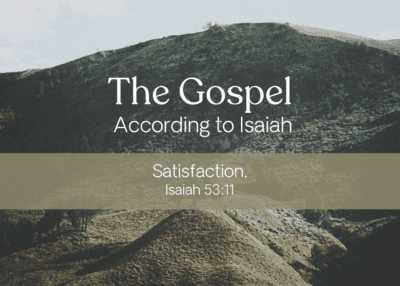Forgiveness is a fruit of life in Christ. This is a distinguishing mark of all who are in Christ, which is why the Lord teaches us to pray in the Lord’s Prayer: “Forgive us our sins as we forgive those who sin against us” (Matthew 6:12).
With this in mind, think with me for a moment about how and when God forgives. God forgives:
1. where wrong has been done
2. when repentance begins
3. because atonement has been made
1. God forgives where wrong has been done.
If I were to say to you, “I forgive you,” you would reasonably say, “Whatever for? I haven’t done anything for you to forgive!” Forgiveness is only appropriate, it is only meaningful, when a wrong has been done.
When God forgives us, it means we’ve wronged Him. Every sin in your life and mine is a personal offence against God. Saul of Tarsus was on a campaign in which he hurt people, and the risen Christ appeared to him on the road to Damascus and said, “Saul, Saul, why do you persecute me?”
Forgiveness can only happen when a wrong has been done. We have wronged God. Thank God, He forgives.
2. God forgives where wrong has been done, when repentance begins.
The story of the prodigal son makes this clear. The son goes off on a journey of rebellion, and when he comes to his senses, he says to himself, “I will go to my father.”
The boy has a change of heart, and he begins the long journey home. Remember what happens: The father sees him from a distance and runs out to meet him. Rather than wait, he runs to him. Why? God embraces us with mercy and forgiveness at the first sign of repentance.
Repenting is a process that every believer begins, but none of us completes, in this life. Our repentance towards God is at best a small part of what it should be. Thank God, He forgives when our repentance begins, not when it is complete. Without this none of us would ever be forgiven.
But friends, remember this: there is no forgiveness without repentance.
There is no forgiveness without repentance. God does not forgive unrepentant sinners. He loves them, and that is what He calls us to do, “Love your enemies, pray for those who persecute you.”
Why does he say that? Because that’s the way God loves sinners. God does not say, “Forgive your enemies.” He says, “Love them. Pray for them.” Because that is what God Himself does. He laid down His life for us while we were yet sinners (Romans 5:8).
“Forgiving the Unrepentant Person”
You often hear Christians talk about “forgiving the unrepentant person.” They say, “You must do it for your own sake, so your life is not controlled by another person.”
But in asking you to forgive the unrepentant person, they’re asking you to do something that God Himself never does, and in the process, they’re changing the nature of what repentance is. God’s forgiveness always effects a restored relationship.
Forgiveness involves the reconciling of two people—one who repents and the other who forgives. I believe, as a pastor, that it is a great mistake to tell people that they must forgive where there is no repentance.
God forgives at the first sign of our repentance, and where forgiveness and repentance meet a relationship is restored. He does not say to us “Forgive your enemies.” He says to us, “Love your enemies.”
3. God forgives where wrong has been done, when repentance begins, because atonement has been made.
There is a sense in which God is the only being in the universe who cannot forgive. For us who are sinners, it is reasonable to be indulgent, lenient, and forgiving towards others whose wrongs may not be very different from our own.
But God is holy. God sees sin in all the ugliness that it is. God is light and in Him is no darkness at all. Every time someone says, “I know God has forgiven me, but I can’t forgive myself,” I want to ask: “Are you saying that it’s easier for God to forgive you, than it is for you to forgive yourself?” James Denny says:
If there should turn out, after all, to be such a thing as a Divine forgiveness of sins, we may be sure it will be such a forgiveness as carries the Divine condemnation and destruction of sin at the heart of it.
That is precisely what we find at the cross. God’s forgiveness flows from the destruction and condemnation of sin in the atoning death of His Son, Jesus Christ, as He bore our sins at Calvary.
Whenever there is an injury, there will always be something in the human spirit that cries out, “What about justice?” The Christian answer is that justice has been poured out on Jesus.
The cross makes forgiveness possible. God forgives where wrong has been done, when repentance begins, because atonement has been made.
How can I get to forgiveness?
Satan can get us so focused on one sin, one problem, one issue that we want to overcome. How do I get over my fear? How can I prevail over this lust? There you are, standing right next to the hurdle, and you can’t get over from that position. You have to begin further back, so you can get a run at it and get some momentum.
You can’t begin with forgiving other people, but you have to go back and begin with your own need to be forgiven. How’s that relevant? The very beginning is seeing my own need of forgiveness.
As I began to reflect on what the Bible says about getting to the place where you can forgive, I realized that everything we need to know is brought together in Ephesians 4. Read more here.








